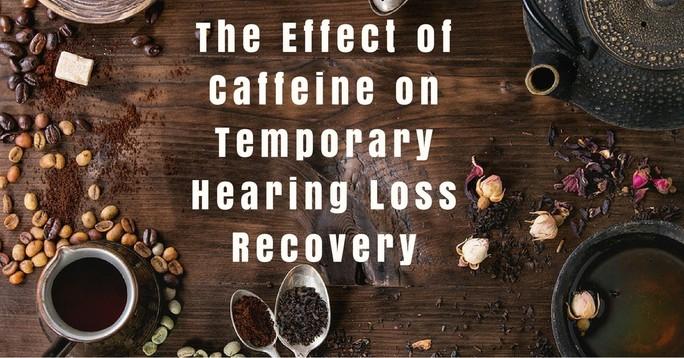
The Effect of Caffeine on Temporary Hearing Loss Recovery
The next time you’re tempted to reach for a quick cuppa, heed the advice of recent research and consider how much caffeine you’re regularly indulging in. A seemingly benign habit, caffeine consumption isn’t as widely discussed and monitored as more disreputable characters, such as alcohol or tobacco. While keeping tabs on the amounts of caffeine consumed is part of a general wellness lifestyle, it’s considerably more essential after exposure to dangerously loud noise. A study by scientists at Quebec’s McGill University Health Centre revealed that daily consumption of caffeine may prevent the recovery of normal hearing after damaging loud noise incidents.
Caffeine in the UK
Approximately 70 million cups of coffee are consumed in the UK every single day. This is just one venue in which caffeine enters a system; it’s also found in dark chocolate and tea. Coffee contains 85mg of caffeine in one cup, while tea has 32mg. A bottle of cola has up to 40mg and chocolate up to 50mg in each bar. If you tend to push the limits on portion size, this means that a morning coffee routine and an afternoon tea and biscuits habit might be enough to push you over your recommended daily amount of the stimulant.
No harm, no foul
In moderate amounts, up to about 400mg per day, caffeine can actually be quite nice for your overall health. It increases focus and concentration and probably improves your football game. But over consumption, around 600mg per day, has adverse side effects. Too much of this good thing and you’re looking at insomnia, anxiety, stomach irritation and a racing heartbeat.
But wait, there’s more
There is a surprising circumstance, though, in which moderate amounts of caffeine might actually cause harm. If you’ve suffered temporary hearing loss, caused by dangerously loud noise levels, caffeine may actually impede recovery. The McGill researchers who found evidence of this occurrence began by surmising that certain substances slowed down normal hearing recovery after a temporary loss of hearing, and initial tests were conducted on groups of guinea pigs. Temporary hearing loss is known as Temporary Threshold Shift (TTS) to medical professionals. Despite the proper name, TTS is quite a normal response to the damage to the auditory system after a too-loud rock concert or fireworks display. Sufferers of TTS typically rebound to normal hearing levels after about 72 hours.
In the universe of this particular study, the guinea pigs that were only subjected to damaging sounds regained their hearing within eight days. However, when the researchers manufactured a scenario in which caffeine and loud sound was concurrently administered, their subjects never fully regained their normal hearing.
Longer road to recovery
Don’t be a guinea pig in real life. If you’ve spent the night out with pals at your favorite rock concert, skip the caffeine boost you think you need the next morning. Flagging energy levels at the office the morning after are a small price to pay when you consider that you might be putting healthy hearing levels at risk. This also might be a particular concern for people working in louder noise environments, such as a manufacturing or agricultural gig. If your ears ever hurt or you hear a dull ringing in your ears after leaving an aggressively noisy work situation, skipping tea time is step one in protecting long term hearing health.
Seek intervention immediately
Self-diagnosing hearing loss is a tricky thing because the symptoms often appear quite differently from what one might realise. Instead of an overall lowering of volume, hearing loss usually presents as distorted frequencies that result in unclear understanding of what is being said in everyday conversation. Going about without treating hearing loss doesn’t help anyone. Relationships, connection and emotional well-being are all more vulnerable when a life with untreated hearing loss is suffered.
If your hearing has undergone noticeable damage, visit us at one of our centres at your earliest convenience. This might be simply setting up a hearing test to determine whether there is a problem to be addressed. If additional steps are to be taken, a discussion with us can instruct you on the best options available for your unique hearing situation. Today’s hearing aids are sleeker, smaller and smarter than ever before and can be folded into almost every lifestyle.
Our Clinics
All House of Hearing clinics are in town centre locations and accessible to public transport and parking. Home visits also available if mobility is an issue.


.png)
.png)
.png)

.png)
